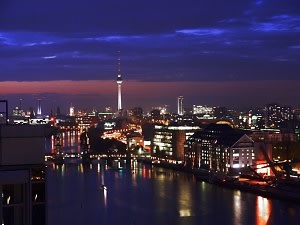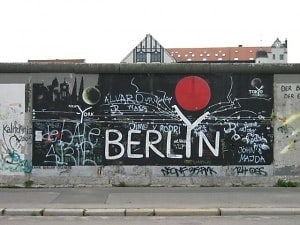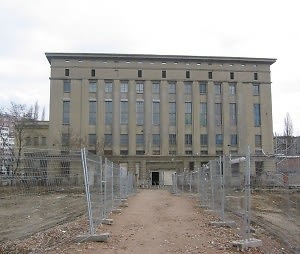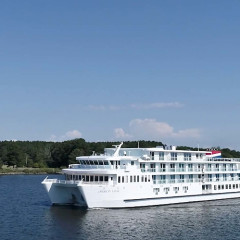 As if the opening of a Soho House in central Berlin weren't a sure enough sign of impending gentrified doom, a gleaming new airport opening next year hopes to bring respectable professionals and professions to the creative mecca and "financial and geographic backwater."
As if the opening of a Soho House in central Berlin weren't a sure enough sign of impending gentrified doom, a gleaming new airport opening next year hopes to bring respectable professionals and professions to the creative mecca and "financial and geographic backwater."
I can't remember exactly when I started hearing about Berlin as the de facto cultural capital of the world. I knew years ago that Jeffrey Eugenides lived there, which gave it considerable cred. Run Lola Run was the coolest movie of 1998, so I figured the city that inspired it--with its pierced, neon-haired punks sprinting through grungy, graffiti-marked streets to a techno score--couldn't be far behind.
But in the last couple of years, the fever was airlifted (sorry) to even the most staid of New York institutions. Carnegie Hall mounted a giant ode to the city in the summer of '07. Artistic Director Clive Gillinson compared Berlin in the '00s to London in the 60's and Paris in the '20s, saying:
“There are times when you feel that a city is almost the center of the world. At the moment, it’s Berlin.”
 Sam Sifton of the Times called Berlin the "most cultured city in Europe" a year later. And last fall, a Times piece on the city's boutique hotel boom referred to it as the "world capital of the emerging creative class."
Sam Sifton of the Times called Berlin the "most cultured city in Europe" a year later. And last fall, a Times piece on the city's boutique hotel boom referred to it as the "world capital of the emerging creative class."
But is all the fawning press too much of a good thing? Despite the exposure, Berliners still suffer from an inferiority complex. In the Times, Nicholas Kulish writes about the mixed reactions to Berlin-Brandenburg International Airport, set to open next year. Reporting from the "hip, but economically strapped metropolis," he says about the project:
"Supporters..contend that it might be the salvation of a city that, despite its incredible historical resonance, has become an economic and geographic backwater. Detractors vehemently argue that the airport will be just another misguided drain of money by a local government critics say has failed to help Berlin realize its potential despite the city’s status as one of the hottest destinations on the planet."
 The problem is that to the people who have made Berlin the destination it is--the writers and DJs and painters toiling away in the city's abandoned factories turned art galleries--the potential has already been met. And turning the city into a financial center (unlikely, since Frankfurt already has that title in Deutschland) or airline hub (as the bridge between European points north, south, east and west) would turn Berlin into the sort of overpriced and overrun "established" capital (think London, Paris, New York) they could no longer afford and happily escaped.
The problem is that to the people who have made Berlin the destination it is--the writers and DJs and painters toiling away in the city's abandoned factories turned art galleries--the potential has already been met. And turning the city into a financial center (unlikely, since Frankfurt already has that title in Deutschland) or airline hub (as the bridge between European points north, south, east and west) would turn Berlin into the sort of overpriced and overrun "established" capital (think London, Paris, New York) they could no longer afford and happily escaped.
Meanwhile, the Great Recession has Germans feeling the pinch just like the rest of the world. And Berliners were already broke! Unemployment stands at 14.1% (the lowest figure I've read for the city, by the way), with 19% of the city on welfare. And Berlin's unique history has long hobbled local industry. Says Kulish:
"Beginning in 1945, the Soviets literally carried factories home from their sector in the east as reparations for Nazi crimes. Gradually, remaining factory owners gave up on the capitalist island of West Berlin during the 28 years that the Wall constricted the movement of goods and people. Finally the reunification of city and country brought an end to subsidies pressed by cold war adversaries"
But few complained as Berlin enjoyed it's bohemian rhapsody. Even Mayor Klaus Wowereit proudly described his city as "poor, but sexy." Will the new airport (costing $3.4 billion and the size of 2,000 football fields) make Berlin rich, but boring? We'll have to wait and see.
The Wall is down, but Berlin would still do well to keep certain people and changes out.


.jpg)
.jpg)



.jpg)
.jpg)
.jpg)




